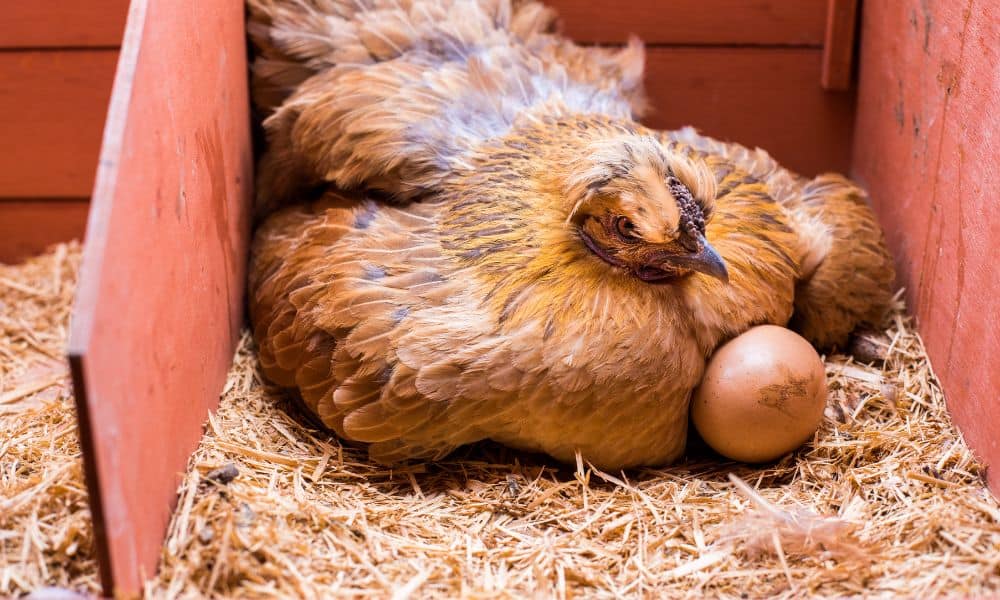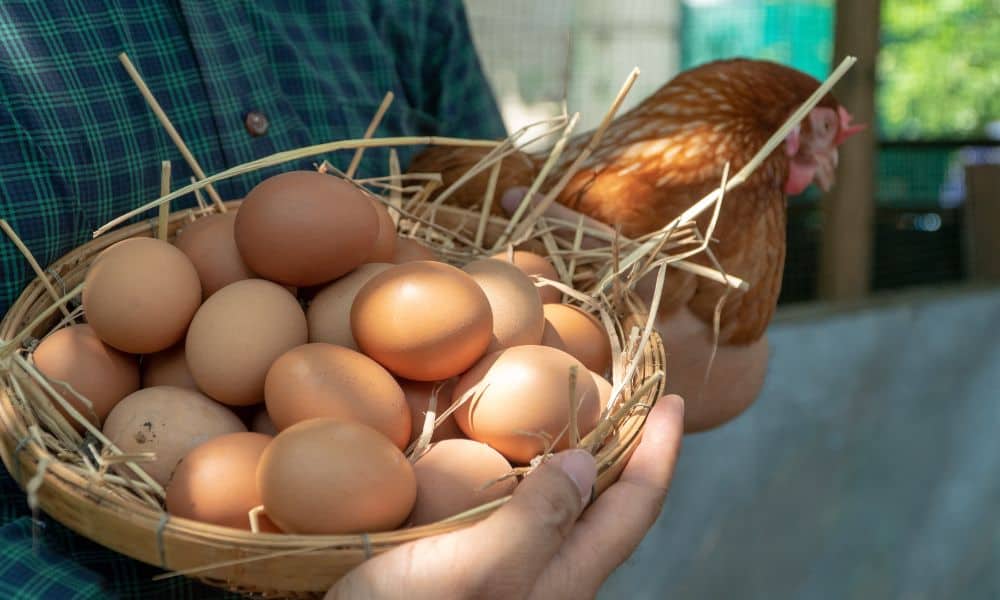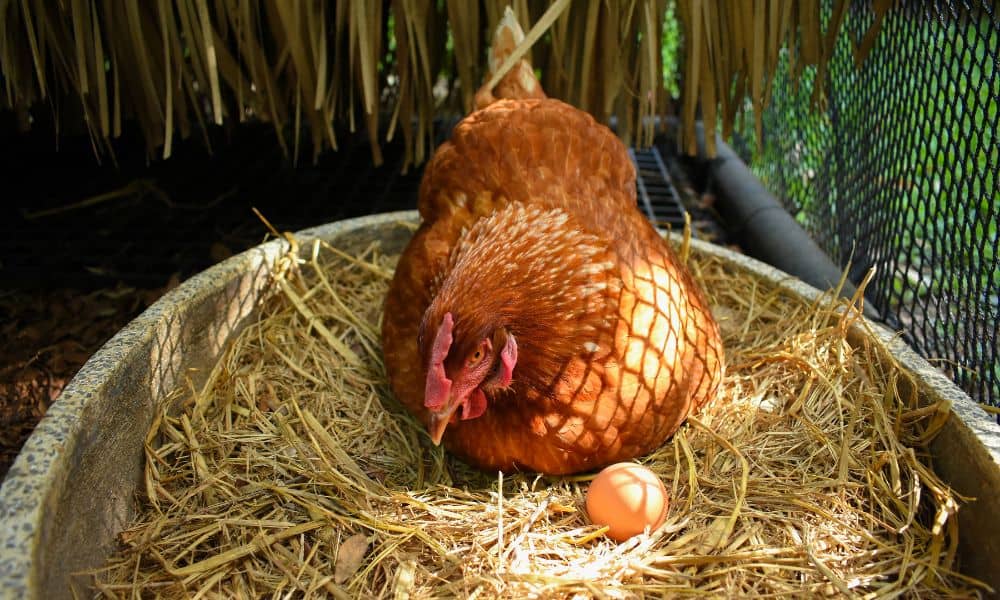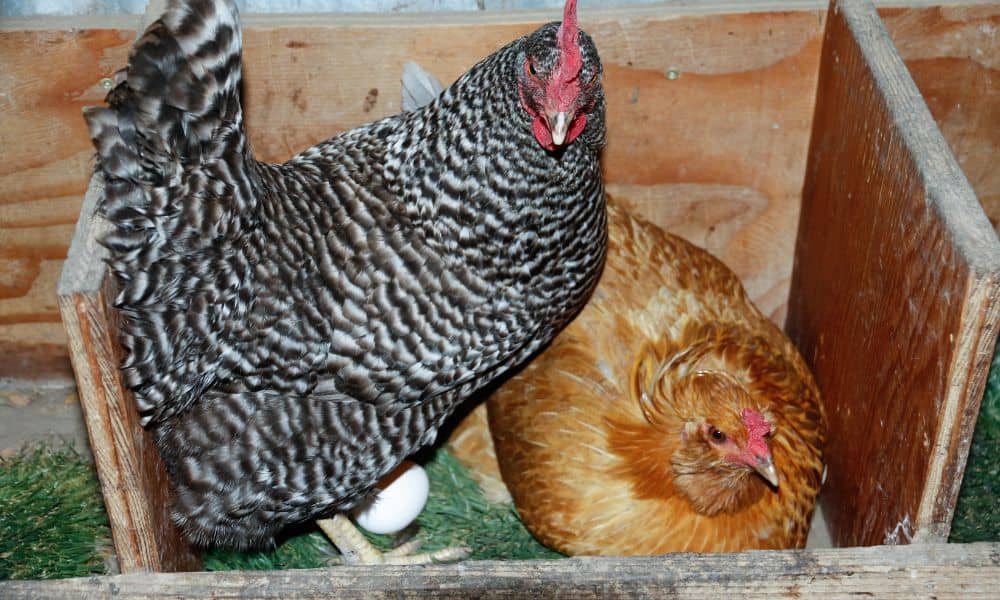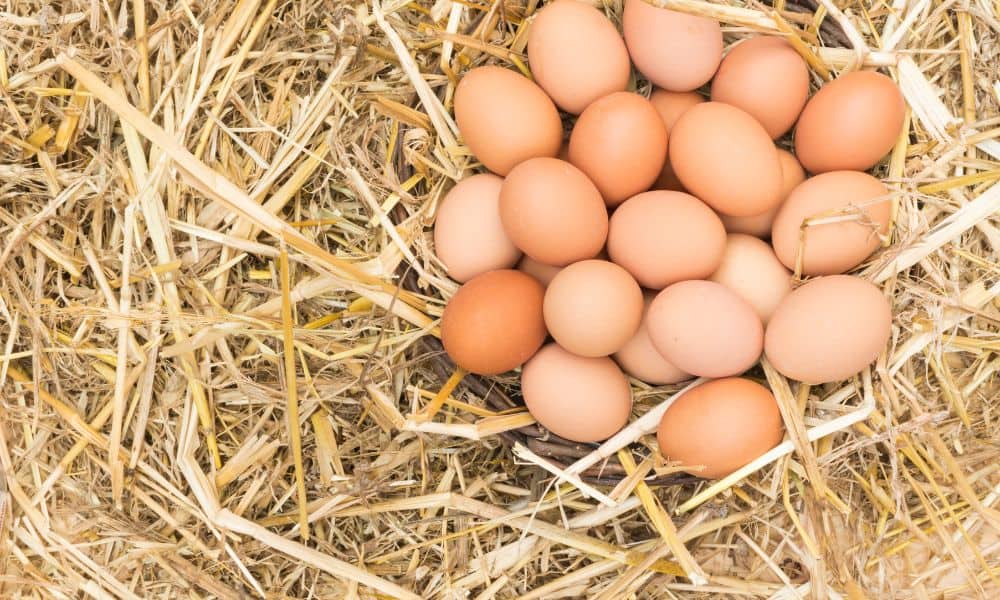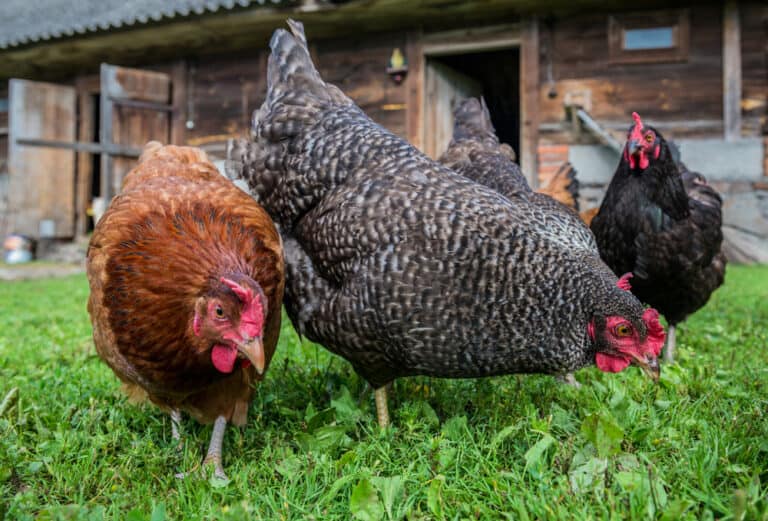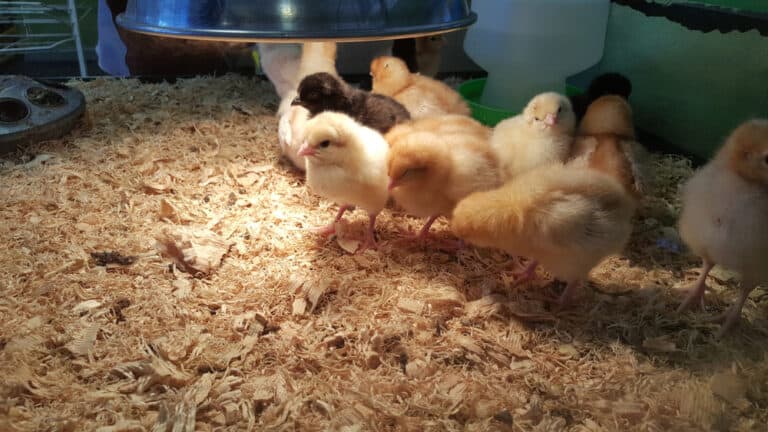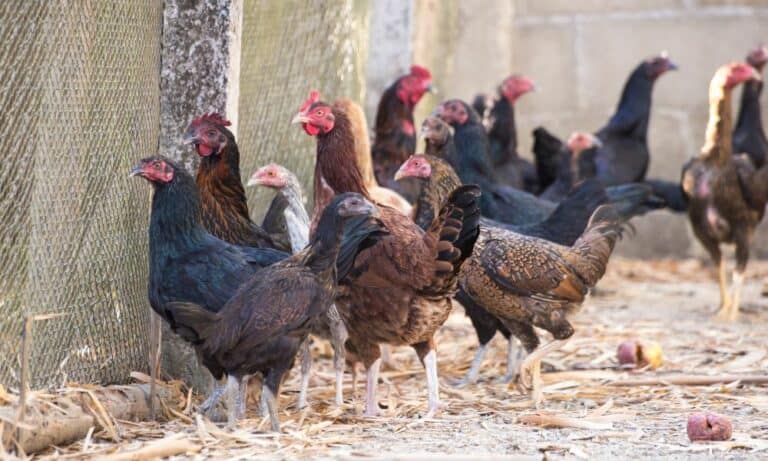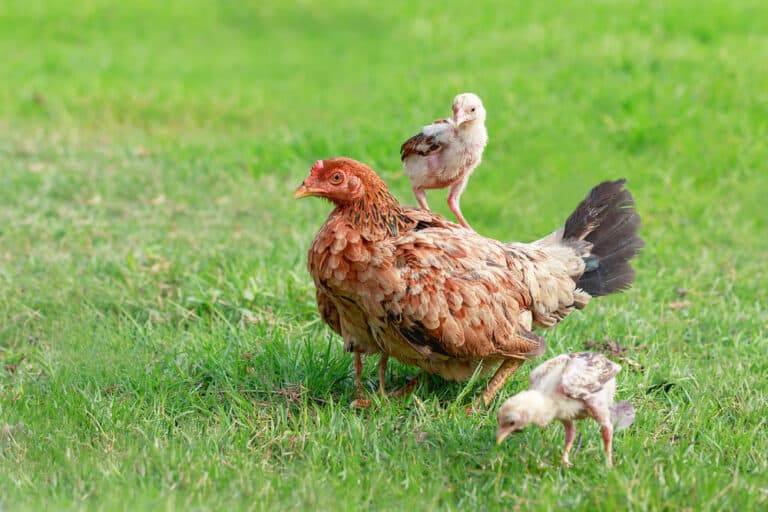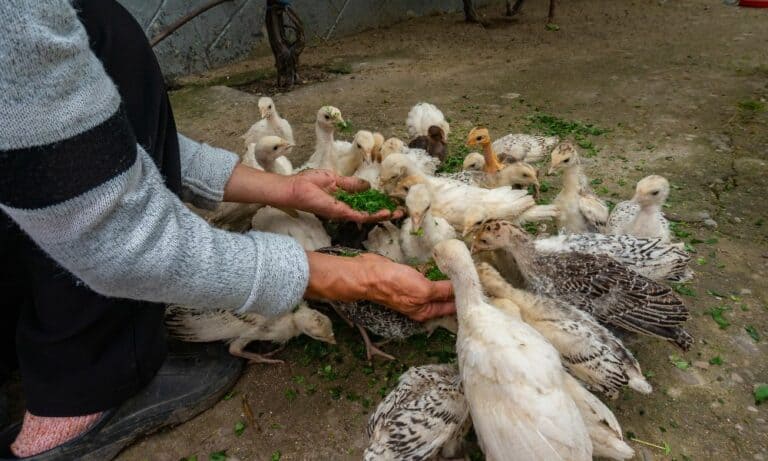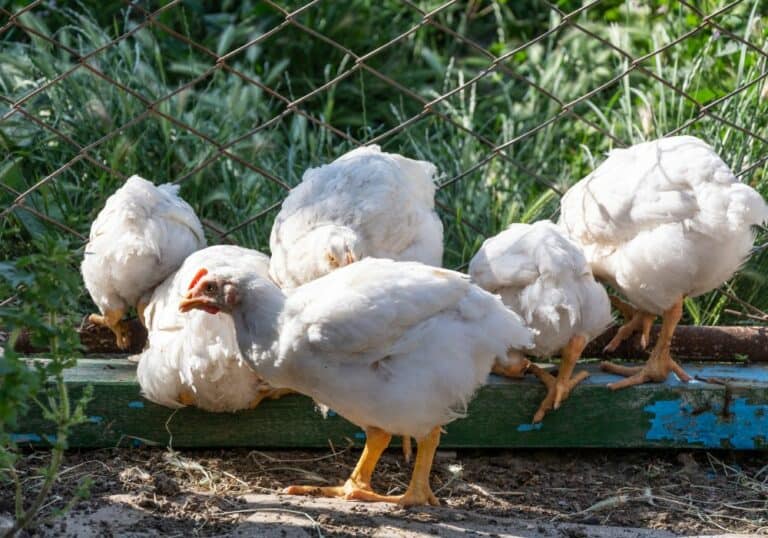If you keep chickens for eggs, you’ll need to know when they do the business so you can be ready to collect them after the eggs are ready – so to help you understand the best time to do it, in this post, we answer the question, what time of day do chickens lay eggs?
What Time of Day Do Chickens Lay Eggs? – The short answer
Before we go into the details of when chickens lay their eggs and why, we can start with a short, simple answer.
When do chickens lay their eggs? Usually in the morning – and usually within the first six hours after sunrise.
Some hens may lay later in the day, but it is unusual for hens to lay after 3pm.
Furthermore, individual hens usually lay their eggs at different times of the day rather than at the same time every day, which is due to the nature of the egg production cycle – so let’s look at that in more detail now.
The egg production cycle
Egg production begins with ovulation when a chicken produces an ovum, which then passes down the chicken’s oviduct. As this happens, the shell, the shell membrane and the egg white also develop.
The beginning of the process is stimulated by light, and from the ovum beginning its journey down the oviduct to the egg being laid takes around 26-28 hours.
After the hen lays the egg, the whole process then begins again after about one hour.
Because the cycle takes 26-28 hours rather than 24, the same chicken will lay subsequent eggs a little later each day, so if an egg is laid at 8am one day, the hen might lay an egg at 10am the next day – and then at midday the following day.
This continues until an egg is laid too late in the day for the process to begin again, in which case the hen will skip a day – and the day after that, the hen will begin again with an egg laid early in the morning.
Or at least that’s the theory, but this will only happen in optimal conditions and with certain egg-laying breeds.
However, several factors can affect a hen’s productivity, which will mean she doesn’t necessarily lay an egg every day. So let’s look at these factors next.
How do the seasons affect egg-laying?
One of the most important factors affecting a hen’s egg-laying prowess is the season.
As we’ve already seen, egg production is stimulated by light, but most chicken breeds need at least 14 hours of sunlight per day, with at least 16 being optimal.
With fewer hours of light than this per day, the hormonal messages that stimulate egg production won’t be sent, and the chicken will start laying significantly less.
During the part of the year when daylight hours are at their shortest, most chickens will stop laying altogether.
This is a natural part of chickens’ annual lifecycle, and this break in laying allows their bodies to recover. At this time, during the colder months, chickens also burn more calories to stay warm, so they have less available energy for the production of eggs.
Some chicken keepers choose to stimulate their chickens during winter to continue laying eggs. This can be done by adding artificial light to their coops to fool their bodies into thinking there is still enough daylight to continue laying.
If you decide to do this, you should also help your chickens by providing extra food due to their need to burn more calories for heat. Giving them plenty of fluffy, warm bedding can also help them by reducing the amount of heat they need to produce for themselves.
However, many chicken keepers allow their birds to have a couple of months off during the winter to recuperate – which is only fair since they work so hard laying eggs for you throughout the rest of the year!
What other factors can affect egg-laying behavior and frequency?
There are several other factors that can affect a chicken’s egg-laying productivity. Here are some of the most important.
1. Age
Most chicken breeds start laying at around six months, although some specialist egg-laying breeds may start as early as four months – and the time of year when they reach egg-laying maturity can also affect this since they won’t start laying in the depths of winter.
After a hen starts laying, the first year will be the most productive, with some breeds capable of producing up to 300 or more eggs in a year.
However, after this, egg production will drop off, and you will get fewer eggs from each hen with each successive year until they eventually stop laying altogether.
2. Breed
Due to years of selective breeding, some breeds now exist that are kept specifically for laying while others are reared for meat.
Although meat breeds will still lay eggs, they won’t lay as many as laying breeds – and as mentioned, the most productive breeds can produce as many as 300 eggs in their first year of laying.
3. Stress
If chickens are stressed, egg laying will stop.
If they feel threatened by a predator – either real or imagined – they will stop laying, and if they are attacked by a predator, they may not lay for some time after, even if they survive the attack.
Stress can also come from parasites such as ticks or worms, and sick chickens will also not lay eggs.
Other stress factors that can reduce or halt egg production include overcrowding or pecking order issues, so reducing these can help your hens become more productive.
4. Diet
Finally, diet is vital to a hen’s productivity.
A hen needs to consume enough nutrients to produce eggs, and if her diet is poor, her productivity will not be as strong – and the egg quality will not be as high either.
One of the most important elements in a laying hen’s diet is calcium, which is needed for producing eggs with strong shells. You can supplement a hen’s diet with oyster shells, which will provide all the calcium she needs.
Fat and protein are also important, and free-ranging chickens will get plenty of these from grubs and bugs they find while out foraging. Supplementing this with the occasional treat of mealworms can also be beneficial.
Other than that, chickens should get most of their nutrients from grain-based chicken feed, and if you use commercial feed, you should ensure you give them feed intended for laying hens rather than meat broilers.
When should you collect your eggs?
So far, we’ve looked at when chickens lay their eggs and why – and we’ve also talked about the factors that can reduce their productivity – but what is the best time to collect your eggs?
The answer to this is that you should figure out a schedule that works best for you and your birds, but there are a few pointers to bear in mind.
Since hens usually lay within six hours of the sun coming up, they should all be done by around midday – so collecting the eggs soon after that should be ideal, although the time you choose will depend on your hens’ specific laying habits.
You should always collect eggs at least once a day, the earlier the better – because the longer you leave them, the greater the risk of them being damaged or even stolen by predators.
If it’s practical for you, checking for eggs twice a day can be even better – and in winter especially, this is a good idea because it will reduce the risk of eggs freezing in low temperatures.
Tip: Leave one egg in the nest to stimulate laying.
Chickens often prefer to lay eggs in a nest that already contains eggs, so leaving one egg can sometimes stimulate your hens – especially the more reluctant layers – to produce more.
This can also help younger hens learn how to do it because seeing an egg in the nest gives them a cue to follow.
FAQs
Do chickens lay eggs at night?
No, it’s extremely rare for a hen to lay an egg at night. Egg production takes place overnight while the hen is sleeping, and she will lay it when she wakes up and the egg is ready. It is not part of the cycle for a hen to wake up during the night to lay an egg.
Is it possible to get a “retired” hen to start laying again?
No, once a hen stops laying due to age, you won’t usually be able to get her to start again. So let her enjoy her retirement!
Which breeds are most productive for egg production?
Leghorns, Rhode Island reds and Australorps are among the best-known breeds capable of producing up to 300 years in the first year of their laying careers.
Chickens usually lay eggs in the morning
So as we’ve seen, hens usually lay their eggs in the morning within six hours of the sun coming up – although some hens can occasionally lay eggs until around 3pm.
Many factors can affect a hen’s laying productivity, and we’ve mentioned the most important ones in this post.
Choosing the best time to collect your eggs will depend on the birds in your flock, but most people find that sometime in the early afternoon is the most convenient moment to do it.

